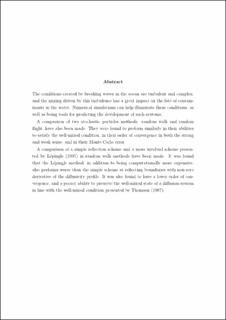Stochastic particle methods for diffusion problems in breaking waves
Master thesis
Permanent lenke
https://hdl.handle.net/11250/3080887Utgivelsesdato
2023Metadata
Vis full innførselSamlinger
- Institutt for fysikk [2686]
Sammendrag
Det har vorte gjort ei samanlikning av ein enkel refleksjonsmetode og ein meir involvert metode presentert av Lépingle (1995) i virrevandringsmetodar. Det vart funne at Lépingle-metoden, i tillegg til å vere berekningsmessig dyrare, også presterte dårlegare enn den enkle metoden ved reflekterande grenser med ikkje-null-derivert diffusivitetsprofil. Den vart også funne å ha ein lågare konvergensorden, og ei dårligare evne til å bevare den godt blanda tilstanden til eit diffusjonssystem i tråd med godt-blanda-kriteriet presentert av Thomson (1987).
Ei samanlikning av to stokastiske partikkelmetodar: virrevandring og tilfeldig flukt, har også verte gjort. Dei vart funne å prestere likt på evna deira til å tilfredsstille godt-blanda-kriteriet, konvergensordenen deira i både sterk og svak forstand, og i Monte Carlo-feilen deira. A comparison of a simple reflection scheme and a more involved scheme presented by Lépingle (1995) in random walk methods have been made. It was found that the Lépingle method, in addition to being computationally more expensive, also performs worse than the simple scheme at reflecting boundaries with non-zero derivative of the diffusivity profile. It was also found to have a lower order of convergence, and a poorer ability to preserve the well-mixed state of a diffusion system in line with the well-mixed condition presented by Thomson (1987).
A comparison of two stochastic particles methods: random walk and random flight, have also been made. They were found to preform similarly in their abilities to satisfy the well-mixed condition, in their order of convergence in both the strong and weak sense, and in their Monte Carlo error.
